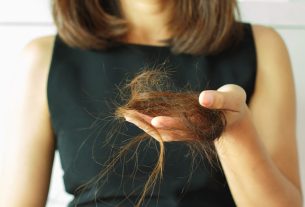Some ways to combat or prevent hair loss during menopause are to practice physical exercise to help regulate hormones in the body and reduce stress, use anti-hair loss shampoos or increase the consumption of foods rich in selenium and proteins.
Hair loss is one of the common symptoms of menopause that occurs due to a decrease in the estrogen hormone that is produced by the ovaries, which can affect the hair follicle, leaving hair thinner and more fragile, leading to hair loss.
These options can help prevent hair loss or thinning, however, the best way to prevent hair loss during menopause is hormone replacement therapy recommended by a gynecologist. See how hormone replacement therapy is done.

7 tips to beat hair loss
There are some tips that help prevent hair loss:
1. Practice physical exercise
Practicing physical exercise, such as walking, cycling or running, is important to prevent hair loss and help with hair growth, as it helps regulate hormones in the body and reduce stress.
In addition, physical exercise also helps control other symptoms of menopause, such as weight gain, insomnia or mood changes, for example. Check out all the symptoms of menopause.
2. Consume foods rich in protein
Consuming foods rich in protein, calcium and magnesium, such as rice, beans, milk or seafood, helps hair growth. See the complete list of foods for hair loss.
3. Eat foods rich in selenium
Eating foods rich in selenium, such as 1 Brazil nut a day, helps keep your hair and nails strong. See the complete list of foods rich in selenium.
Furthermore, Brazil nuts are rich in zinc, vitamin B, omega-3 and vitamin E, which are important nutrients for strengthening hair and preventing hair loss.
4. Massage the scalp
Massage your scalp and hair with a mixture of 10 drops of lavender essential oil and 1 spoon of avocado oil, washing thoroughly afterwards, helps to improve blood circulation in the scalp and nourish the hair strands, keeping them healthy and preventing hair loss.
5. Shampoo antiqueda
Using anti-hair loss shampoos, containing biotin, D-panthenol, vitamin B6 or collagen polymers, helps to reduce hair loss, leaving hair softer and more voluminous.
6. Use conditioner
Putting conditioner on your hair and washing it off after a few minutes helps protect your hair before going to the pool or beach, for example, preventing it from becoming further weakened.
7. Take supplements
If a woman experiences excessive hair loss, she should consult a gynecologist or dermatologist to diagnose the problem and begin the necessary supplementation. See all dietary supplement options for hair loss.
See how to prepare a delicious vitamin for hair loss:
Remedy for hair loss during menopause
A remedy for hair loss during menopause that may be recommended by a gynecologist is minoxidil, which should be applied to the scalp, as it helps to stimulate hair follicle growth and increase the caliber of blood vessels, improving circulation in the area and prolonging the hair growth phase. Learn more about minoxidil.
Bibliography
- BLUME-PEYTAVI, U.; et al. Efficacy and Safety of Once-Daily Minoxidil Foam 5% Versus Twice-Daily Minoxidil Solution 2% in Female Pattern Hair Loss: A Phase III, Randomized, Investigator-Blinded Study. J Drugs Dermatol. 15. 7; 883-9, 2016
- BREASTCANCER.ORG. Symptoms of menopause: Vaginal changes. Available at: <https://www.breastcancer.org/es/efectos-secundarios-tratamiento/menopausia/tratamiento-sintomas/cambios-vaginales>. Access on September 23, 2022
- GRACE, Clarisa R.; FREEMAN, Ellen W. Onset of the Menopause Transition: The Earliest Signs and Symptoms. Obstet Gynecol Clin North Am. 45. 4; 585-597, 2018
- TAECHAKRAICHANA, Nimit; et al. Climacteric: concept, consequence and care. J Med Assoc Thai. 85. 1; S1-15, 2002
- TAKAHASHI, Traci A.; JOHSON, Kay M. Menopause. . . . Med Clin North Am 99. 3; 521–534,
- SANTORO, Nanette; EPPERSON, C. Neill; MATHEWS, Sarah B. Menopausal Symptoms and Their Management. Endocrinol Metab Clin North Am. 44. 3; 497-515, 2015
- BRAZILIAN SOCIETY OF ENDOCRINOLOGY AND METABOLOGY – SÃO PAULO REGIONAL. Menopause. 2017. Available at: <http://www.sbemsp.org.br/images/2017/maisbem/encarte_maisbem27.pdf>. Accessed on February 4, 2020
- PORTUGUESE SOCIETY OF GYNECOLOGY. National Consensus on Menopause. 2016. Available at: <https://www.spginecologia.pt/uploads/Consenso_Menopausa_2016.pdf>. Accessed on February 4, 2020

Sign up for our newsletter and stay up to date with exclusive news
that can transform your routine!
Warning: Undefined array key "title" in /home/storelat/public_html/wp-content/plugins/link-whisper-premium/templates/frontend/related-posts.php on line 12
Warning: Undefined array key "title_tag" in /home/storelat/public_html/wp-content/plugins/link-whisper-premium/templates/frontend/related-posts.php on line 13





